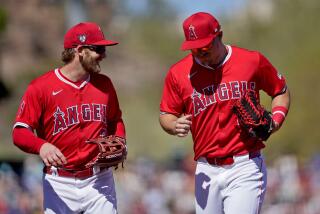ANGELS : First Hurdle Is Thursday for Blyleven
- Share via
MESA, Ariz. — Bert Blyleven is scheduled to put his surgically repaired right shoulder to its first modest test Thursday, when he pitches in the Angels’ final intra-squad game.
Blyleven threw 15 minutes of batting practice and 10 minutes on the side Monday, matching his longest workout of spring training. Asked whether he can fully rehabilitate his shoulder by the time the season starts, the 39-year-old right-hander shrugged.
“I’ll probably have a better indication when games start and I get my innings in there,” he said. “My curveball is not as sharp as it usually is, but you can’t expect miracles.
“I’m still trying to build up my arm strength. I’m not worried about throwing breaking balls. In batting practice, I’m just throwing a lot of fastballs to build up my arm.”
Angel Manager Doug Rader said Blyleven’s showing Monday was “light years along” from his first spring outings, but said intra-squad and exhibition games will more accurately measure Blyleven’s readiness.
“He threw three pitches over the plate, three speeds,” Rader said. “He rushed it a little bit, but he always does that. The glimpses that I saw I thought were good.”
Chuck Finley will oppose Mike Fetters in the Angels’ first intra-squad game today at Gene Autry Park. Fetters is expected to pitch despite a strained left quadriceps muscle.
Also due to pitch are Scott Bailes, Bryan Harvey, Matt Keough, Tim Burcham, Chris Beasley and Rafael Montalvo. Jack Howell, who has been working out at second and third besides catching, will play third base.
Kirk McCaskill is the only starter scheduled to pitch in Wednesday’s intra-squad game. Blyleven, Mark Langston, Jim Abbott, Scott Lewis and Joe Grahe will pitch Thursday.
The Angels will play their first exhibition and B games Friday at Yuma against the San Diego Padres. Pitching coach Marcel Lachemann will announce the rotation for those games today.
Bob McClure, who experienced tightness in his left shoulder Sunday and Monday, said he feels better and will resume throwing. Even so, he is expected to get a few days off.
“He threw too hard too soon,” trainer Ned Bergert said.
McClure said the problem is unrelated to the tendinitis in his left elbow that limited him to 11 appearances last season.
“My elbow’s fine,” he said. “Once I get over this, that’s it. I’m ready.”
Pitcher Jeff Richardson, who has a strained right shoulder, won’t pitch in the intra-squad games and catcher Ron Tingley, who has a sore lower back, is on a light workout schedule.
In keeping with club policy of not conducting contract talks once games begin, the Angels will settle the status of nine unsigned players today. They are Jim Abbott, Kent Anderson, Dante Bichette, Junior Felix, Fetters, Grahe, Bobby Rose, Luis Sojo and Lee Stevens.
Clubs can unilaterally renew players’ contracts at an amount of the club’s choosing, but can’t cut a salary by 20% or more or go below the major league minimum of $100,000. Abbott was the highest-paid of the nine last season at $185,000. Felix earned $155,000 with Toronto.
The Angels’ new infield of first baseman Wally Joyner, second baseman Sojo, shortstop Dick Schofield and third baseman Gary Gaetti played well in its first practice as a unit.
“When you have the right people and the right continuity in place, that’s what happens,” Rader said. “They were very impressive. They went about 20 minutes and I didn’t see a whole lot of mistakes.”
Ken Ravizza, who teaches in the Health and Physical Education Department at Cal State Fullerton, will work with the Angels this season as part of what he called a sports-psych education program.
“The basic approach is that mental skills can be taught like physical skills,” said Ravizza, who has a Ph.D in health and physical education. “So often, a player is told, ‘Relax.’ What does that mean?
“There are two premises the program is based on. No. 1, as athletes, there’s so much you don’t have control over. But you have control over how you choose to respond. Second, you’ve got to be in control of yourself before you try to controlling your performance. These are skills that you can work on.”
More to Read
Go beyond the scoreboard
Get the latest on L.A.'s teams in the daily Sports Report newsletter.
You may occasionally receive promotional content from the Los Angeles Times.







